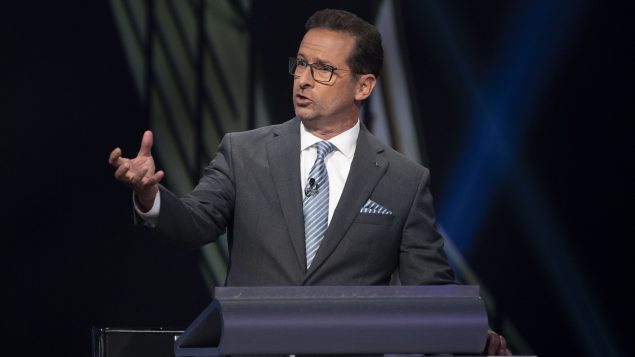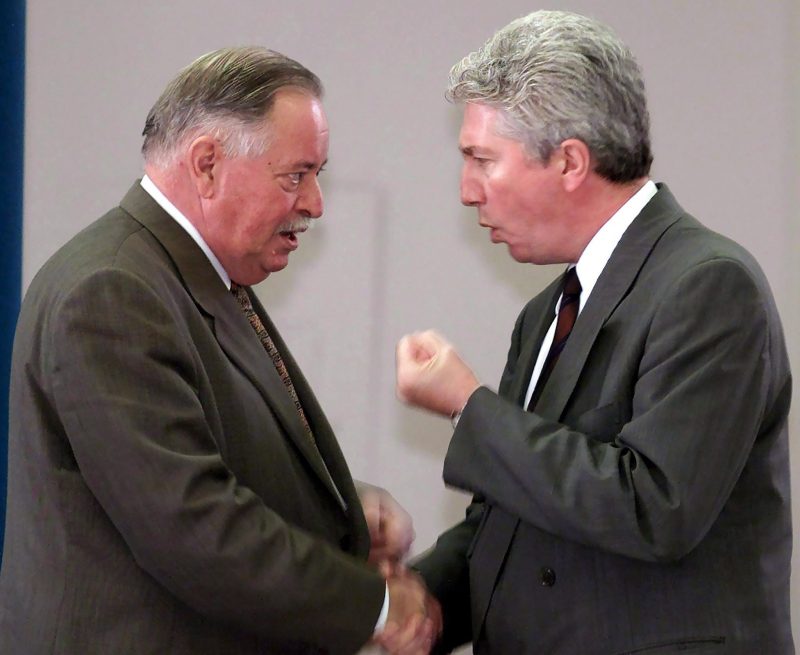The separatist Bloc Québécois party emerged as the big winner of Monday’s federal election, regaining official party status in the House of Commons and more than tripling the number of seats it will hold in Canada’s 43rd Parliament.
The once-faltering party, which runs candidates only in the French-speaking province of Quebec, took seats away from the Liberals, Conservatives and the left-of-centre New Democratic Party (NDP).
The Bloc won 32 seats out of the 78 in Quebec, thanks to a remarkable resurgence in polls under Yves-François Blanchet’s leadership, especially among francophone voters.
The Bloc had 10 seats prior to this election.
“We are coming back from far, but we will go even further,” said Blanchet in a victory speech late Monday evening.
‘Sovereignty is not our mandate’

Bloc Quebecois leader Yves-Francois Blanchet takes part in the the Federal leaders French language debate in Gatineau, Que. on Thursday, Oct. 10, 2019. (Adrian Wyld/THE CANADIAN PRESS)
However, throughout the 40-day campaign the party had toned down its separatist rhetoric, presenting itself as the only party that can defend the interests of Quebec unconstrained by commitments to other regions of Canada.
“We understand the depth of our mandate, but we also understand its limitations,” Blanchet said. “This time, for this time, the realization of sovereignty is not our mandate.”
Given that no party won majority in the new parliament, Blanchet told supporters the Bloc was open to collaborating with any government to advance provincial interests. The Liberal Party, which won 157 seats, 13 shy of a majority, is expected to return to power as a minority government if it manages to secure the support of other smaller parties in the House of Commons.
“If what is proposed is good for Quebec, you can count on us,” Blanchet said.
Shifting centre-right?

Bloc Quebecois Leader Gilles Duceppe (right) shakes hands with former Quebec premier Jacques Parizeau after Parizeau addressed the Bloc caucus, on Parliament Hill in Ottawa, Thursday, June 1, 2000. (Fred Chartrand/THE CANADIAN PRESS)
Founded in 1991, following of the failure of Meech Lake and Charlottetown accords to recognize Quebec’s distinct status in the confederation, the Bloc was a major presence in the House of Commons in the 1990s and early 2000s, even becoming the official opposition following the 1993 federal election.
The Bloc was reduced to just four seats in the 2011 election that saw the Orange Wave of the NDP sweep through Quebec. In 2015, the party won ten seats.
For most of its existence, the Bloc has been aligned with the Parti Québécois, a provincial left-of-centre separatist party.
But in the latest election, Blanchet aligned his party with the hugely popular Coalition Avenir Québec (CAQ) of Quebec Premier Francois Legault. The CAQ, a nationalist centre-right provincial party founded by Legault, a former Parti Quebecois cabinet minister, swept to power in 2018.
Bill 21 effect
Another issue that contributed to Bloc’s success was the controversial provincial legislation that bans some public service employees in positions of authority – judges, police officers and teachers – from wearing visible religious symbols, such as Muslim headscarves, Jewish yarmulkes, Sikh turbans or large crosses.
Bill 21 is very popular and has significant support within Quebec, but is extremely contentious outside the province.
Blanchet was the only party leader to fully support the controversial legislation adopted by the National Assembly earlier this summer.







For reasons beyond our control, and for an undetermined period of time, our comment section is now closed. However, our social networks remain open to your contributions.